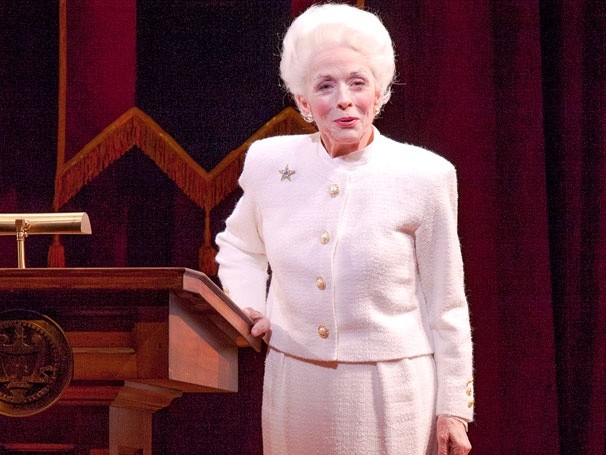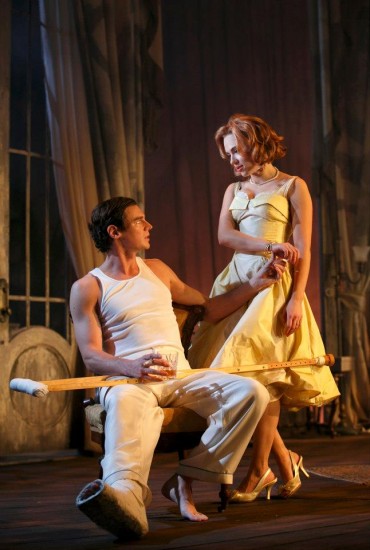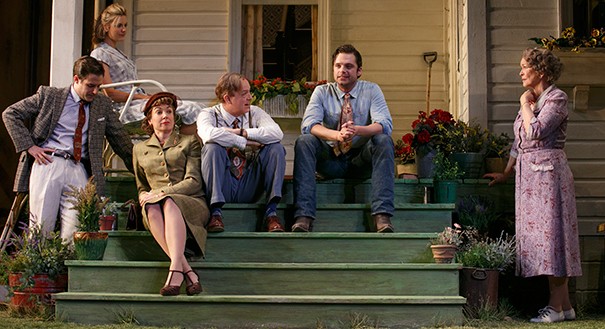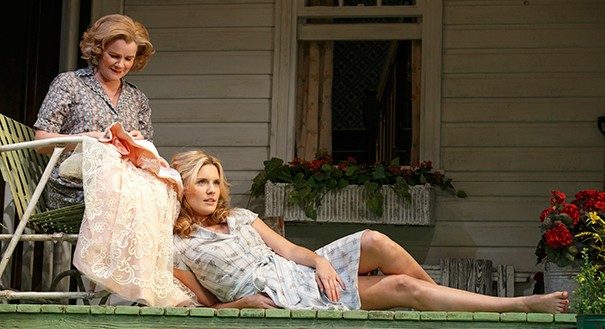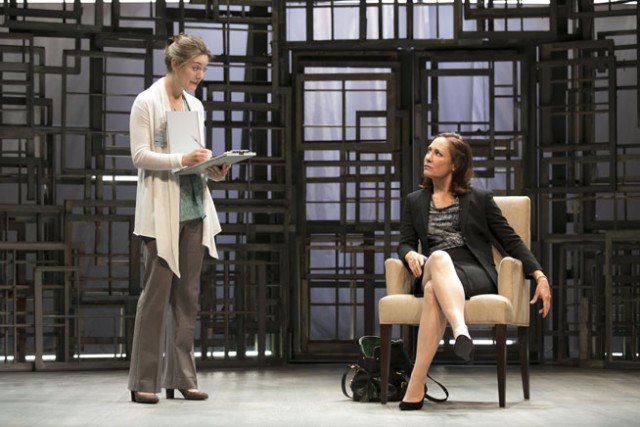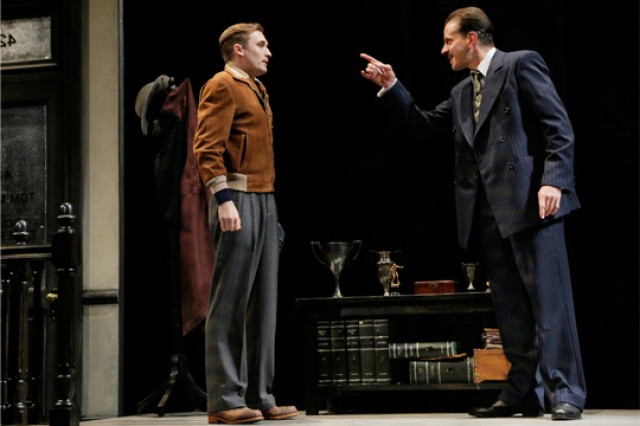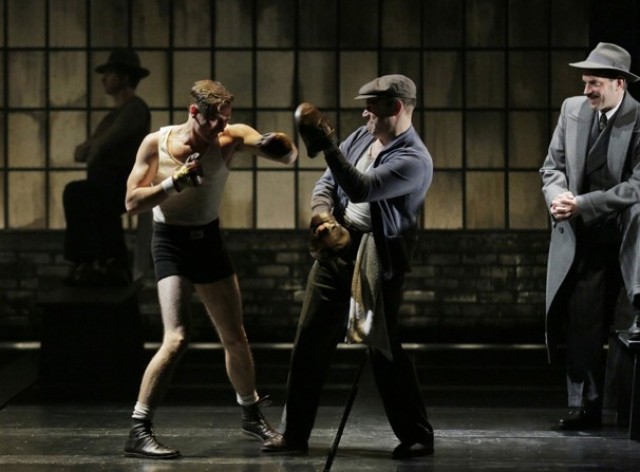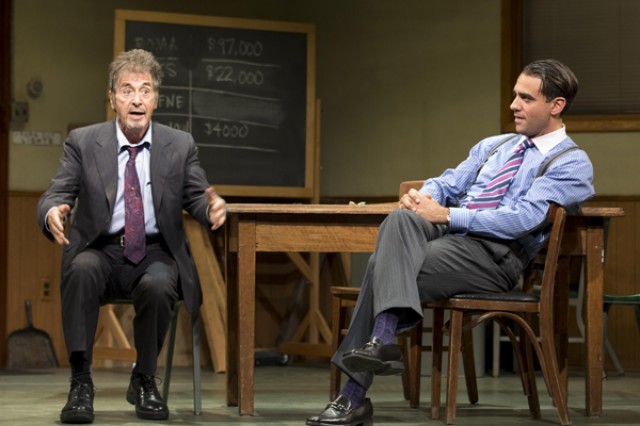
Shelley “the Machine” Levene (Al Pacino) talks shop with Ricky Roma (Bobby Cannavale) in Mamet revival (photo by Scott Landis)
Gerald Schoenfeld Theatre
236 West 45th St. between Broadway & Eighth Aves.
Through January 20, $82-$162
www.glengarrybroadway.com
This was supposed to be the season of David Mamet on Broadway, with the premiere of The Anarchist, starring Patti LuPone and Debra Winger, at the Golden Theatre and an all-star revival of the playwright’s 1984 Pulitzer Prize-winning Glengarry Glen Ross two houses down at the Gerald Schoenfeld on West 45th St. The former was a critical and popular disaster, closing after twenty-three previews and seventeen regular performances, and the opening of the latter was pushed back from November 11 to December 8, rarely a good sign, even if Hurricane Sandy was given as at least part of the reason. Glengarry Glen Ross made its debut on the Great White Way in 1984, was a popular movie directed by James Foley in 1992, and won Tony Awards for Best Revival and Best Featured Actor (Liev Schreiber) in Joe Mantello’s 2005 version, but it feels surprisingly dated today. Al Pacino, who was nominated for Best Supporting Actor as hotshot Ricky Roma in the film, now stars as Shelley “the Machine” Levene, a has-been salesman seemingly on his last legs, no longer able to sell the pieces of land owned by the company he has worked for for so long. The shockingly short first act takes place in a cheesy Chinese restaurant set, introducing the six protagonists: Levene, who is begging his boss, John Williamson (David Harbour), to give him the primo leads so he can recapture his mojo; angry, foul-mouthed salesman Dave Moss (Scrubs’s John C. McGinley), who tries to convince the much milder George Aaronow (The West Wing’s Richard Schiff) to help him steal the treasured leads and sell them to a competitor; and finally, “Always be closing” Richard Roma (Tony nominee Bobby Cannavale of Boardwalk Empire, Nurse Jackie, and The Motherfucker with the Hat), who spots an easy mark in James Lingk (Clybourne Park Tony nominee Jeremy Shamos). Before the audience can barely get comfortable in their seats, intermission arrives, severing whatever connections were being made with the story.
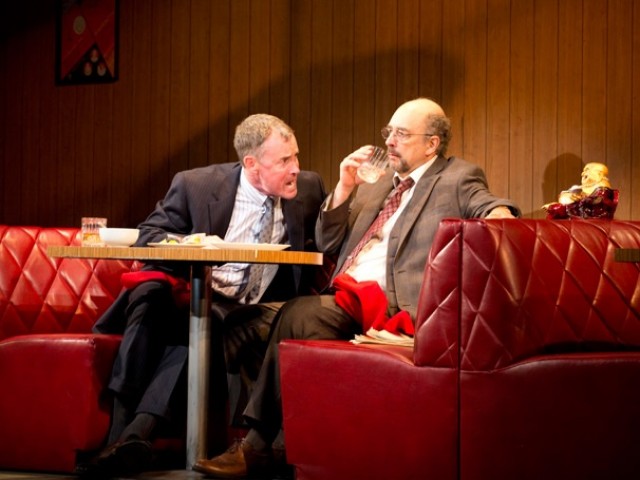
Dave Moss (John C. McGinley) shares his master plan with George Aaronow (Richard Schiff) in revival of GLENGARRY GLEN ROSS (photo by Scott Landis)
The second act is much stronger, and thankfully longer, set in the real-estate office that has been ransacked. Here the actors really get to shine and the characters are allowed to develop, with Pacino chewing bits of scenery here and there but taking few big gulps, Schiff being appropriately wormy as the worried Aaronow, McGinley getting very loud as Moss, Harbour giving nuance to Williamson, and Cannavale playing it big and loud as the leader in the Cadillac contest, as the salesman with the most money on the board. But the production, directed by Daniel Sullivan (The Columnist, Prelude to a Kiss), feels old and tired, like we’ve seen it all before. And that might be the problem — that it has returned to Broadway too soon after the previous revival. In addition, with Netflix and iTunes, it is easier to watch the film whenever one wants, and Foley’s movie features additional characters and scenes and the hard-to-beat cast of Pacino, Jack Lemmon, Alec Baldwin, Ed Harris, Alan Arkin, Kevin Spacey, and Jonathan Pryce, making the current revival seem like it’s missing something in comparison. Recent revivals of much older fare, including Death of a Salesman, Who’s Afraid of Virginia Woolf? and Golden Boy, have been successful at least partly because their main stories and characters have timeless qualities, but this Glengarry Glen Ross feels like it’s still stuck in the Reagan ’80s, a relic of another age. It’s still an enjoyable show with solid performances, but it lacks the power that helped previous productions establish its big-time reputation.
